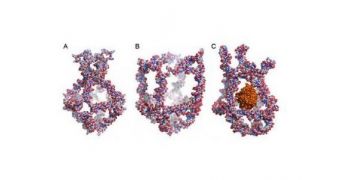A group of Danish researchers from the Aarhus University announces the development of a new nanorobot constructed out of DNA, which can encapsulate active biomolecules – such as drugs – and then release them at specified target locations.
The research team, which also featured investigators from the United States and Italy, says that it is now one step closer to a viable nanorobot for drug delivery. This would be an important achievement in medicine, since it would allow doctors to target conditions such as cancer with extreme precision, while minimizing damage to surrounding healthy cells.
The device proposed in this study is shaped like a nanoscale cage, and self-assembles when eight unique DNA molecules recruited from the body's own are mixed together, e! Science News reports.
This tiny structure has already been shown to be capable of permeating through cellular walls in cultures. Both loading and unloading of active biomolecules is made in response to temperature changes. The main advantage of ferrying drugs in such an enclosure is that they do not interact with the immune system of the bloodstream, and therefore suffer no loss in efficiency.

 14 DAY TRIAL //
14 DAY TRIAL //